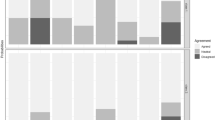Abstract
Background
There are no nationwide data on the methods residency programs are using to assess trainee competence. The Accreditation Council for Graduate Medical Education (ACGME) has recommended tools that programs can use to evaluate their trainees. It is unknown if programs are adhering to these recommendations.
Objective
To describe evaluation methods used by our nation’s internal medicine residency programs and assess adherence to ACGME methodological recommendations for evaluation.
Design
Nationwide survey.
Participants
All internal medicine programs registered with the Association of Program Directors of Internal Medicine (APDIM).
Measurements
Descriptive statistics of programs and tools used to evaluate competence; compliance with ACGME recommended evaluative methods.
Results
The response rate was 70%. Programs were using an average of 4.2–6.0 tools to evaluate their trainees with heavy reliance on rating forms. Direct observation and practice and data-based tools were used much less frequently. Most programs were using at least 1 of the Accreditation Council for Graduate Medical Education (ACGME)’s “most desirable” methods of evaluation for all 6 measures of trainee competence. These programs had higher support staff to resident ratios than programs using less desirable evaluative methods.
Conclusions
Residency programs are using a large number and variety of tools for evaluating the competence of their trainees. Most are complying with ACGME recommended methods of evaluation especially if the support staff to resident ratio is high.
Similar content being viewed by others
References
Accreditation Council for Graduate Medical Education (ACGME). Outcome Project. <http://www.acgme.org/outcome/project/proHome.asp>. Accessed January 20, 2008.
Accreditation Council for Graduate Medical Education (ACGME). Outcomes Project Toolbox of Assessment Methods <http://www.acgme.org/outcome/assess/toolbox.asp>. Accessed January 20, 2008.
HassettJM,ZinnerstromK,NawotniakRH,SchimpfhauserF,DaytonMT. Utilization of standardized patients to evaluate clinical and interpersonal skills of surgical residents. Surgery. 2006;140(4):633–9.
KliglerB,KoithanM,MaizesV,et al. Competency-based evaluation tools for integrative medicine training in family medicine residency: a pilot study. BMC Med Educ. 2007;7(1):7.
LynchDC,SwingSR,HorowitzSD,HoltK,MesserJV. Assessing practice-based learning and improvement. Teach Learn Med. 2004;16(1):85–92.
OttestadE,BouletJR,LighthallGK. Evaluating the management of septic shock using patient simulation. Clinical investigations. Crit Care Med. 2007;35(3):769–75.
WallensteinJN,AnderDS. Use of an Advanced Skills OSCE to evaluate core competencies in an emergency medicine clerkship. Acad Emerg Med. 2007;14(5S):215.
BlandJM,AltmanDG. Multiple significance tests: the Bonferroni method. BMJ. 1995;310(6973):170.
BlumenthalD,GokhaleM,CampbellEG,et al. Preparedness for clinical practice: reports of graduating residents at academic health centers. JAMA. 2001;286:1027–34.
Accreditation Council for Graduate Medical Education/American Board of Medical Sepecialties Joint Initiative. Attachment/Toolbox of Assessment Methods Version 1.1, September 2000 <http://www.acgme.org/Outcome/assess/ToolTable.pdf>. Accessed January 20, 2008.
GrayJD. Global rating scales in residency education. Acad Med. 1996 Jan;71(1 Suppl):S55–63.
RingstedC,ØstergaardD,RavnL,PedersenJA,BerlacPA,Van Der VleutenCPM. A feasibility study comparing checklists and global rating forms to assess resident performance in clinical skills. Med Teach. 2003;25(6):654–8.
SilberCG,NascaTJ,PaskinDL,EigerG,RobesonM,VeloskiJJ. Do global rating forms enable program directors to assess the ACGME competencies? Acad Med. 2004;79(6):549–56.
SwingSR. Assessing the ACGME general competencies: general considerations and assessment methods. Acad Emerg Med. 2002;9(11):1278.
GordonP,TomasaL,KerwinJ. ACGME Outcomes Project: selling our expertise. Fam Med. 2004;36(3):164–7.
GorollAH,SirioC,DuffyFD,et al. A new model for accreditation of residency programs in internal medicine. Ann Intern Med. 2004;140(11):902–9.
Acknowledgment
The authors acknowledge the thoughtful review of this manuscript provided by Drs. Lawrence Smith, MD and Stephen Kamholz, MD.
Conflict of Interest
There are no conflicts of interest to report for Drs. Saima Chaudhry and Brent Beasley. Dr. Eric Holmboe is employed by the American Board of Internal Medicine, a non-profit organization that performs assessment of physicians.
Author information
Authors and Affiliations
Corresponding author
Rights and permissions
About this article
Cite this article
Chaudhry, S.I., Holmboe, E. & Beasley, B.W. The State of Evaluation in Internal Medicine Residency. J GEN INTERN MED 23, 1010–1015 (2008). https://doi.org/10.1007/s11606-008-0578-0
Published:
Issue Date:
DOI: https://doi.org/10.1007/s11606-008-0578-0




